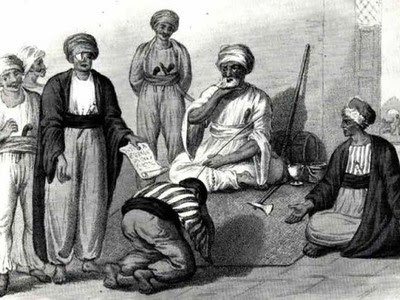The Practice of Jizyah – Jizyah Series – Part 3
The first implementation of Jizyah was done by the Prophet himself on the Nazranite Christians of present day Yemen. The Nazranites were a great & prosperous culture of the Arabian peninsula of those times.
They were forced to pay Jizyah the treaty (protection promise) could be revoked anytime from the side of the Muslims. Thus, after the Prophet’s death, first Caliph Abu Bakr honored the treaty, but the second Caliph Umar revoked it for ‘Arabia could have no non-Muslims’.
The Nazranites were forced to leave Arabia and settled in a new town in Kufah outside Arabia, but that part also became Muslim soon after and they were forced to pay Jizyah on them. In a few decades Jizyah was increased many times & Nazranites disappeared from history.
Thus an ancient people were destroyed and while they died they financed the conquests of Islamic armies. Arabic has a word called ‘Nazrana’, meaning a gift, which is famous in north India too. Very few know the history behind it.
Whenever Jizyah was too high, and more non-Muslims paying it would convert to Islam and thus stop the back-breaking tax. Whenever this happened much, some greedy Muslim princes would lessen the Jizyah to keep the coffers flowing, thus discouraging conversions.
But when it was too low and not many were converting, a religious prince would increase it so that more non-Muslims would convert. However the direction towards conversion to Islam was definite as all these countries became completely Islamic later on except a few.
Jizyah tax was fixed on a town or a community and not on individuals in most cases. So as more non-Muslims converted, the rest of the non-Muslims who did not convert to Islam had to pay more tax per capita to keep practicing their ancestral religion.
This encouraged the rest of non-Muslims paying Jizyah to convert more, which led to more tax on those who didn’t convert. It was a vicious cycle which always aided the conversion to Islam. Jizyah, more than anything else, was a tool of conversion to Islam.
Sometimes when non-Muslims had no money left to pay Jizyah, the Muslim masters would give them the ‘option’ to sell their wives and children. In some cases, they did, like in the case of Barqah town near Alexandria when Muslim commander Amar bin al-‘As gave them the ‘option’.
In next thread, we will see what were the terms of Jizyah and what disabilities did it put the non-Muslims under.

No comments:
Post a Comment